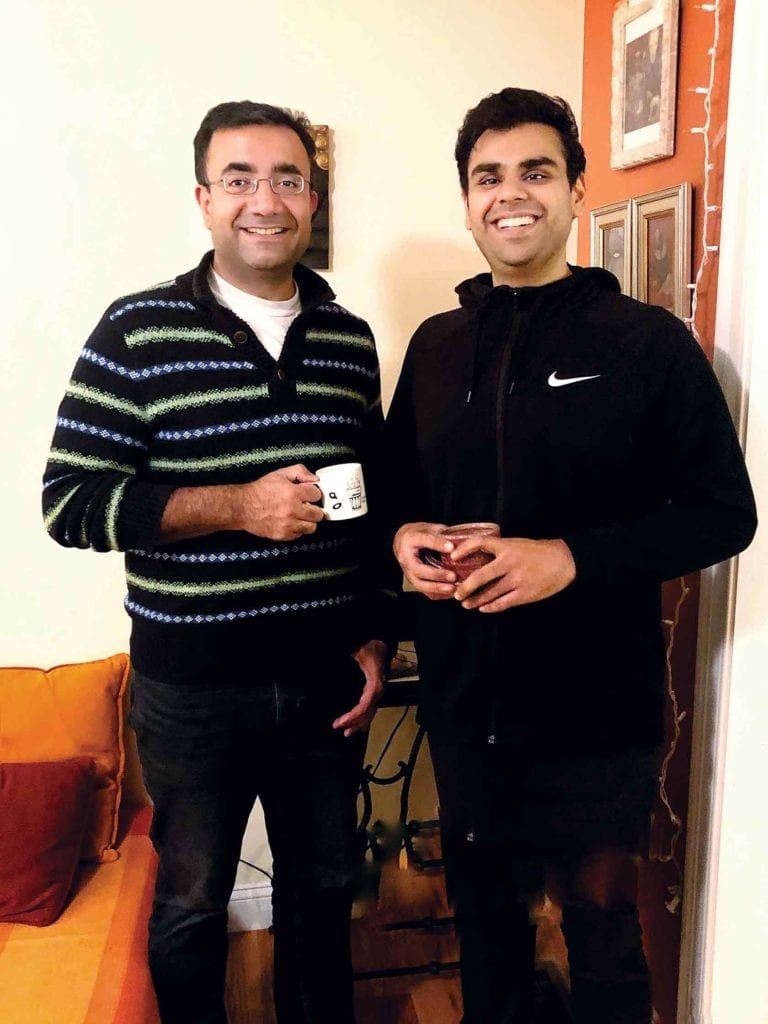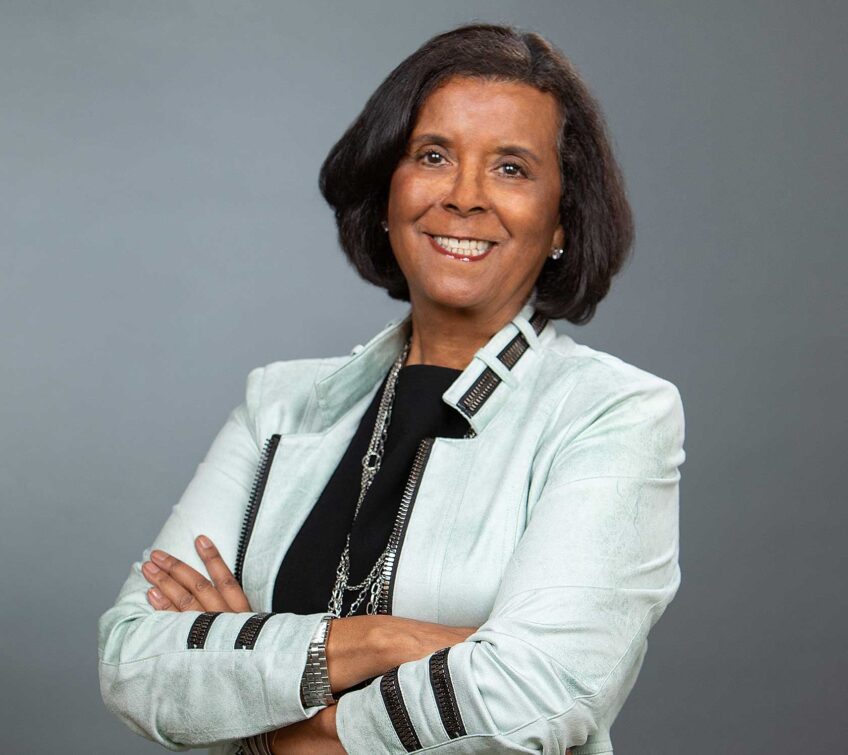Tea time with a chai twist
Duo spreading authentic Indian tea culture in Boston

Chai was an essential part of both Vishal Thapar’s and Rushil Desai’s upbringing; Thapar started making chai as a 10-year-old boy in India, and Desai cannot recall a family breakfast without chai being served at the table. The two entrepreneurs were disillusioned at the lack of authentic chai readily available in the U.S. and in 2015, formed Boston Chai Party, LLC to fill this gap in the market.
The company’s main product is chai concentrate, available in unsweetened, sweetened and pumpkin spice flavors. The concentrate is sold to consumers through local retailers and supplied to local cafes who serve it by the cup.
According to Thapar, Boston Chai Party’s concentrate contains no preservatives, the tea is sourced from a fair-trade farm in India and the spices are certified organic. “We’re trying to build a healthy beverage. We’re not adding anything other than our basic ingredients, true to its taste and Indian flavors,” he says.
Even with the sweetened version of the concentrate, the amount of sugar added is subtle. “Per serving, you would get approximately 60 calories and 14 grams of sugar, which is one-third of what you get out of a Starbucks cup of chai,” says Thapar.
Traditional Indian chai is nuanced. Every cup of chai begins with three base ingredients of water, milk and tea leaves. Then you add the spices, and the possibilities of ratio and flavor are endless. “Most chai will have some ginger,” says Thapar. “It’s seasonal too. For example, cardamom is a more prominent spice in the summer.”
Their 750-milliliter pouch of Raw Spice Strong Brew Chai Concentrate makes 10 to 12 cups of chai. Consumers or cafes add their own milk and boil it with the concentrate in the specified ratio on the pouch. The concentrate contains a spice mix of ginger root, cinnamon, cardamom, fennel, dry ginger, cloves, black pepper and star anise.
In contrast, most mainstream cafes in the U.S. make chai using a syrup concentrate, with preservatives, acidifiers, and a lot of sugar, says Thapar.
“Our mission is to educate people in America about the possibilities of chai — how to make it, where it comes from, the different notes and spices,” he says. Thapar and Desai have created an instructional video for the Boston Chai Party website to show viewers how to make chai.
In addition to the way it’s made, Thapar says there’s also a disconnect with the way chai is perceived.
“For us, chai is a cultural phenomenon, it’s meant to be enjoyed with people. To me, it’s normal to sit down, have a conversation and take a moment while sipping your tea or chai,” says Thapar. “Chai is that connection with others. It’s a bridge between people.”
Starting up
Thapar, who still works full-time in computer science, says the business startup costs were minimal at first, but grew over time. “In total, over the last few years, we’ve put about $50,000 of our own money into the company,” he says. Thapar and Desai are the sole employees and sole owners of Boston Chai Party.
Operational costs include renting a kitchen facility at Foundation Kitchen in Somerville, licensing, inventory and packaging.
Thapar and Desai trademarked Boston Chai Party and hired a friend to design the logo. A brand-new package design is on the way, says Thapar.
Customers can order a cup of Boston Chai Party chai at nine area cafe locations: three Barismo cafe locations, Wildflower Pantry in Brighton, True Grounds in Somerville, Union in Allston, Red Barn in Framingham and Seaport and Davis Square Donuts.
Thapar says the business relationship with the Barismo chain was formed through a contact, but as for the rest, “we just walked in, and talked to the owners.”
Boston Chai Party is slowly building up its retail business too. Pouches of chai concentrate are available for purchase at Wildflower Pantry in Brighton, Good Health Natural Foods in Quincy and Cambridge Naturals in Porter Square. They are priced at $13.99 each at Cambridge Naturals.
The company also sells individual chai ingredients, such as Assam black tea leaves and spice mixes on its website, and has been a vendor at SoWa Farmers Market.
Thapar says they had to prove to cafe owners that their premium product was worth the premium price.
Boston Chai Party’s wholesale price to cafes is about a $1 per serving. “Cafes are used to paying a lot less. They sell customers a $4 cup of chai after getting the concentrate for less than 50 cents per serving. However, cafes are able to get back that 50 cents because more and more customers are coming back for the chai,” says Thapar.
The Kendall Square Barismo location, for example, has seen a 200 percent increase in sales of chai since the cafe started using Boston Chai Party concentrate, he says. “This makes up for our premium pricing, and we have replicated this result in other cafe locations.”
Boston Chai Party makes its masala, or spice mix, fresh every week and sources its black tea leaves from Assam, India every six months. “The masala we use in our products is the same masala we use at home and it’s the same masala my mother uses at home,” says Thapar.
As someone who regularly visits India, where his parents reside, Thapar was able to scout out the right tea farm to import from. “Rushil and I wanted to address the slavery and mistreatment that exists on some tea farms and make it part of our mission to source from a place with decent health insurance and a decent wage for their workers,” he says.
Challenges
Boston Chai Party started off as a passion project for Thapar and Desai, who were co-workers at Massachusetts General Hospital at the time. An authentic cup of chai was missing in the mainstream market and the duo wanted to fix this problem. But it took a lot of trial-and-error to figure out how to turn the idea into a profitable company.
They spent three years coming up with the idea for a packaged chai concentrate. “Initially, our idea was to bring chai to the market in its most authentic form,” said Thapar. “But that would mean you would need to have a specific set-up in every cafe for customers to boil everything together and strain it. That’s how you make chai in India.”
They experimented making the chai themselves and delivering it to office clients. “We quickly realized it was a logistical nightmare,” says Thapar.
At one point, the company took a loss when a cafe deal fell through. “We were in talks with this big cafe and ended up ordering a lot of bottles to sell our chai in, but the deal didn’t go through and now we have all this bottle inventory,” says Thapar. “These are the sort of pitfalls you have to try to anticipate.”
They have put the bottle idea on hold for now until they can operate at a bigger scale. After a year of market research, the entrepreneurs learned that there is a cap on the amount of money consumers are willing to spend on a 15-ounce bottle of chai. “Most consumers don’t want to spend more than four dollars,” says Thapar. “But we couldn’t get our costs below a point where that retail price would keep us profitable.” For that, they would need to produce at a higher volume, he says.
Sharing the chai culture
Thapar and Desai are still learning how to grow their company and spread their message of what authentic chai tastes like and the significance it has in Indian culture.
“Almost every household in India drinks chai,” says Thapar. “My 2-year-old dips his morning cookies in my chai and my 6-year-old knows how to make it, although he’s not allowed to make it on his own yet.”
The duo feels so strongly about educating U.S. consumers and baristas about real chai that they are willing to teach local cafes how to make it, regardless of whether they buy Boston Chai Party concentrate. “So at least they make it the way chai has been made for centuries. We want them to serve an authentic product and not an appropriated one,” Thapar says.
“People are passionate about their food and I can relate to that,” he adds. “Chai is my childhood and it’s on display everywhere in cafes, markets, and stores. I want to share the true experience of someone growing up in India; I want to share the genuine experience of chai.”






